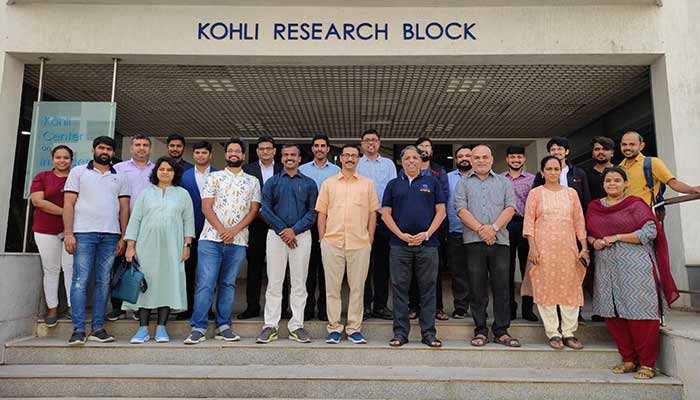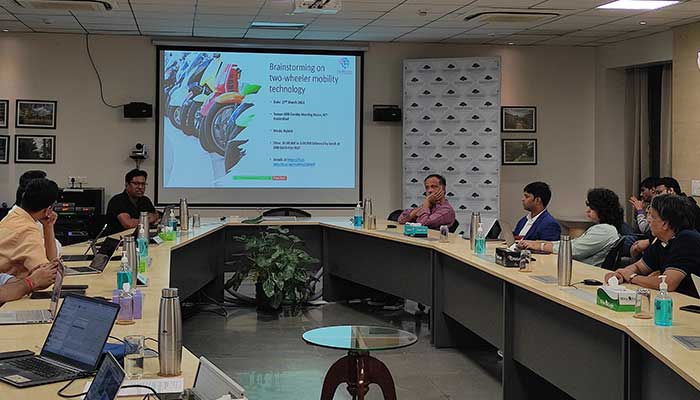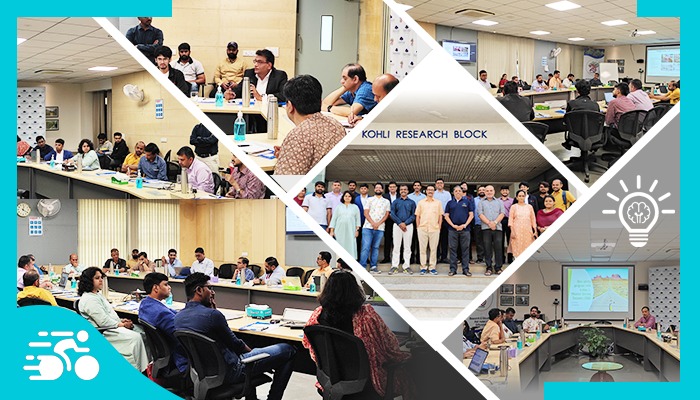Two-wheeler safety technology has not kept pace with the strides made in the 4-wheeler segment. Here’s the first attempt to bridge the gap.
Time was when new-age safety features in cars were limited to the high-end 4-wheeler segment. Today, ADAS or Advanced Driver Assistance Systems are commonplace in mass-market vehicles too. However, in a country where the popularity of 2-wheelers is only increasing – they are inexpensive, more efficient in manoeuvring through dense traffic and often the first choice of aspirational, upwardly mobile families – crash avoidance technologies and safety sensors are woefully lacking in them. With the objective of improving 2-wheeler safety using tech innovation, a brainstorming session was held at IIITH on 17 March 2023 involving academics, industry experts and government officials.
Improving technology and a simultaneous upgradation in road infrastructure has led to a decrease in accident deaths over the years. However, 2-wheeler drivers still comprise the highest percentage of fatalities. The panel enumerated several challenges about the 2-wheeler segment such as poor maintenance of roads, heavy traffic, reckless riding and others. Tech-based solutions for improving 2-wheeler riding safety include improving infrastructure, creating smart accessories such as smart helmets, GPS trackers along with monitoring and studying the behaviour of the driver under various conditions.
Creation of a Riding Dataset
Much like the India Driving Dataset that has been created for autonomous vehicles in joint collaboration with IIITH (through iHub-Data established by DST (Department of Science and Technology) for NM-ICPS (National Mission for Interdisciplinary Cyber Physical Systems), and Intel, IIITH will embark on the creation of a dataset expressly for 2-wheeler mobility. iHub-Data focuses on using data-driven technologies in the domains of healthcare and mobility. In order to create the dataset, it has been proposed to design a customised 2-wheeler with key sensors such as the accelerometer, gyroscope, GPS tracking, wheel speed measurement, LIDAR, camera and environmental sensors. The 2-wheeler which will be available for researchers across the country to collaborate for data collection and analysis will be designed in such a way as to install project-specific sensors on board for collaborators to collect data related to their research.
Current Research In 2-Wheeler Mobility
Speaking of research that has been conducted until now in the space of 2-wheeler mobility, the academics in the panel enumerated their work and briefly presented their findings. Dr. Deepak Gangadharan of IIITH elaborated on his team’s research whose vision was to enhance the safety of 2-Wheelers through driving event recognition including critical driving events. Dr. Kavita Vemuri talked about 2-wheeler safety that is in sync with machine design, driver’s physiology, driver’s visual attention, and environmental conditions. Manufacturers need to understand that comparing the rider’s centre of gravity to the vehicle’s centre of gravity makes it risky for both the rider and the pillion. She also described a 2-wheeler study conducted on eye gaze which when analysed shows that professional riders are more concerned about pedestrians and prefer being in herds while amateurs are more concerned about the vehicles. Dr. Jaswanth & Dr. Hrishikesh from Woxen University and IIIT Sricity respectively presented their research on the road quality index (RQI) as a numerical score that reflected the level of wear and tear on the road, as well as its overall safety and performance. A score like this could assist the rider in critical situations and support to avoid accidents. Dr.Rohit Saluja from IIT Mandi elaborated about research conducted on counting the number of trees on the road, helmet and license plate violations, pothole recognition and triple riding cases using a GoPro camera where these violations are highlighted in a box to enable better visual representation. From the industry, Hala Mobility founder Srikanth Reddy mentioned trying CNN+RNN hybrid algorithms.

Proposed Solutions
A range of solutions were mooted by the panel specific to 2-wheeler road safety that included vehicle specific attire for high cc 2-wheelers, improving road infrastructure such as filling potholes, creating awareness about the roads, an inflatable suit like an airbag, tech to identify the vehicle condition, intelligent AI vehicle control and sensor networks research to change the dynamics of 2-wheelers, antilock braking system (ABS) that is adaptable to road conditions, in-built speed limits in EVs, blind spot alerts, 360 degree sensors, depth spacing sensors, timely checks of vehicle health that coincides with availability of spares by manufacturers, free helmets by the government, making helmets mandatory for both rider and pillion with camera in bike console to ensure enforcement of the same and so on.

To submit project proposals on various aspects of 2-wheeler mobility, please visit: https://ihub-data.iiit.ac.in/mobility/wp-content/uploads/2023/02/cfp.html

Sarita Chebbi is a compulsive early riser. Devourer of all news. Kettlebell enthusiast. Nit-picker of the written word especially when it’s not her own.


Next post